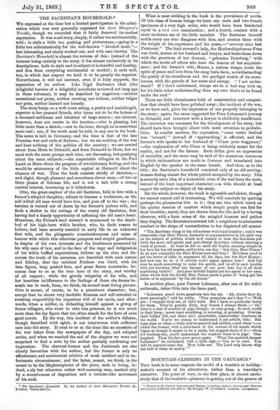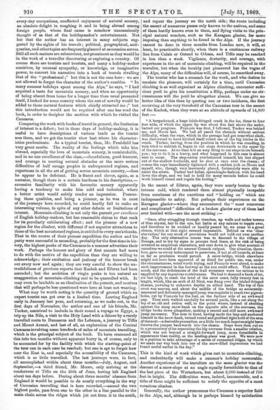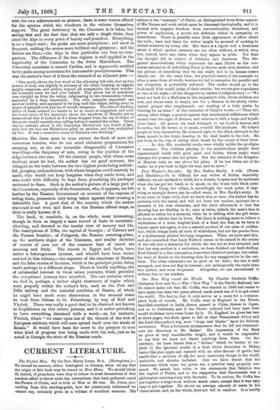MOUNTAIN-CLIMBING IN THE CAUCASUS.• This book is in some respects
the model of a tourist's or holiday- maker's account of his adventures, rather than a traveller's narrative. The point of view, in the first place, is almost exclu- sively that of the tourist's—pleasure in getting out of the groove of Travels in the Central Caucasus and Bashan, including visiU to Ararat and Tabrew and Ascents of Katbek and Elbrus. By Douglas W. Freshfleld. London: Longman".
every-day occupations, unaffected enjoyment of natural scenery, an absolute delight in roughing it and in being abroad among foreign people, whose final cause is somehow unconsciously thought of as that of the holidaymaker's entertainment. Not but that the author has an interest in many subjects sug- gested by the sights of his travels ; political, geographical, anti- quarian, and other topics are frequentlyglanced at as occasion serves.
Still all such matters are subservient, notprominent as they would be in the work of a traveller discovering or exploring a country. Of course there are tourists and tourists, and many a holiday-maker contrives, by unusual sympathy, or knowledge, or imaginative power, to convert his narrative into a book of travels rivalling that of the " professional ;" but this is not the case here : we are not allowed to forget the character of the author's rambles. " In many summer holidays spent among the Alps," he says, " I had acquired a taste for mountain scenery, and when an opportunity of being absent from home for a longer time than usual presented itself, I looked for some country where the zest of novelty would be added to those natural features which chiefly attracted me ;" but this introduction would not be required after one has read the book, in order to decipher the motives with which he visited the Caucasus.
Comparing the work with books of travel in general, the limitation of interest is a defect ; but in these days of holiday-making, it is useful to have descriptions of various lands as the tourist sees them, and we get the tourist view best where his character- istics predominate. As a typical tourist, then, Mr. Freshfield has very great merits. The reality of the feelings which take him abroad, especially the love of mountain scenery, is unmistakable, and in no one excellence of the class,—cheerfulness, good-humour, and courage in meeting natural obstacles or the more serious difficulties of half savage peoples in unfrequented regions, and expertness in all the art of getting across mountain country,—does he appear to be deficient. He is fluent and clever, again, as a narrator, though there is a certain hardness in his descriptions,— excessive familiarity with his favourite scenery apparently having a tendency to make him cold and technical, where a better artist would subtly render an impression. Possess- ing these qualities, and being a pioneer, as he was in most of the journeys here recorded, he could hardly fail to make an interesting volume, in spite of any other defects or limitations of interest. Mountain-climbing is not only the pursuit par excellence of English holiday-makers, but has reasonable claims to that rank for its peculiarly exhilarating effect ; and the pioneer of a new region for the climber, with different if not superior attractions to those of the best accustomed regions, is entitled to every one's thanks. That in the course of their pioneer expedition the author and his party were successful in ascending, probably for the first time in his- tory, the highest peaks of the Caucasus in a manner advertises their work. Perhaps the honour and glory of first ascents had more to do with the motive of the expedition than they are willing to acknowledge ; their exultation and jealousy of the honour break out every now and again ; they are very careful to show the un- truthfulness of previous reports that Kasbek and Elbruz had been ascended ; but the ambition of virgin peaks is too natural an exaggeration of mountain-climbing zeal to be quarrelled with. It may even be laudable as an idealization of the pursuit, and motives that will perhaps be less questioned were here at least not wanting.
What may be worth noting is the quantity of ground which an expert tourist can get over in a limited time. Leaving England early in January last year, and returning, as we make out, in the first days of November, the author and one of his friends, Mr. Tucker, contrived to include in their round a voyage to Egypt, a trip up the Nile, a visit to the Holy Land with a detour by a rarely travelled route to Damascus and the Lebanon, a journey to Tiflis and Mount Ararat, and last of all, an exploration of the Central Caucasus involving some hundreds of miles of mountain travelling, which is the principal subject of the book. To have crammed all this into ten months without apparent hurry is, of course, only to be accounted for by the facility with which the starting-point of the boar can in each case be reached; but one is apt to forget how near the East is, and especially the accessibility of the Caucasus, which is so little travelled. The last journeys were, in fact, all accomplished within about three months—July, August, and September, —a third friend, Mr. Moore, only arriving at the rendezvous at Tiflis on the 26th of June, having left England about ten days before. During about three months' absence from England it would be possible to do nearly everything in the way of Caucasian travelling that is here recorded,—ascend the two highest peaks, pass from one to the other in a line parallel to the main chain across the ridges which jut out from it to the south,
and repeat the journey on the north side ; the route including the ascent of numerous passes only known to the natives, and some
of them hardly known even to them, and flying visits to the prin- cipal natural wonders, such as the Karagam glacier, far more imposing than anything to be found in the Alps. If the journey
cannot be done in three months from London now, it will, at least, be practicable shortly, when there is a continuous railway line from Calais or Ostend to Odessa, and Tiflis may be reached in less than a week. Vigilance, dexterity, and courage, with expertness in the art of mountain-climbing, will be required in the traveller, but when the locality just pioneered has the vogue of the Alps, many of the difficulties will, of course, be smoothed away. The tourist who has a stomach for the work, and who desires to emulate the pioneers, will certainly for a time, until Caucasian
climbing is as well organized as Alpine climbing, encounter suffi- cient peril to give his constitution a fillip, perhaps under no cir- cumstances will the peril be altogether absent. We can give 110 better idea of this than by quoting one or two incidents, the first occurring at the very threshold of the Caucasian tour in the ascent of the Kasbek, when they were at an altitude of upwards of 14,800 feet :— " A bergachrund, a huge icicle-fringed crack in the ice, three to four feet wide, of which the upper lip was about five feet above the under, barred our progress. Francois was first, I followed, Tucker was behind me, and Moore last. We had all pased the obstacle without serious difficulty, when the rope, which in the passage had got somewhat slack, was discovered to have hitched itself round one of the big icicles in the crack. Tucker, having, from the position in which he was standing, in vain tried to unhitch it, began to cut steps downwards to the upper lip of the crevasse. At no time is it an easy thing to cut steps in ice beneath you ; try to do it in a hurry, and what happened in this case is almost sure to occur. The step-cutter overbalanced himself, his feet slipped out of the shallow footholds, and he shot at once over the chasm; of course the rope immediately tightened with a sudden jerk on Moore and myself, who, though very insecurely placed, fortunately were able to resist the strain. Tacker had fallen, spreadeagle-fashion, with his head down the slope, and we had to hold for many seconds before he could work himself round and regain his footing."
In the ascent of Elbrus, again, they were nearly beaten by the intense cold, which rendered them almost physically incapable from numbness of the exertions and "holding on" which are indispensable to safety. But perhaps their experiences on the Karagam glacier—where they encountered the " most numerous and complicated " difficulties of a broken glacier any of them had ever battled with—are the most striking :—
" Once, after straggling through trenches, up walls and under towers of blue crystal, fair to the eye, but liable at any minute to topple over, and therefore to be avoided or hastily passed by, we came to a great chasm, which at first sight seemed impassable. Behind us was `clear starvation,' for our stock of provisions would not hold out over another day. The only alternative course was to descend to the village of Zenaga, and to try by signs to procure food there, at the risk of being arrested as suspicious characters, and sent down to give what account of ourselves we could at the nearest Cossack outpost. Our situation, there- fore, gave us every inducement to persevere, if not at all hazards, at least as far as prudence would permit. A snow-bridge, which elsewhere might not have been approved of as fitted for public use, was, under the circumstances, voted worth trying, and Francois went ahead, to make such improvement in the footway as the axe could effect. This was not mach, and the deficiencies of the frail structure were too serious to be supplied by any ingenious contrivances. We had to descend a bank of ice, six feet high, to reach the level of the snow crest, fully twenty feet in length, which, like an arch of Al Sirat, was flung over the icicled-fringed chasms, yawning to unknown depths on either hand. The top of this crest was uneven, and about the middle of the bridge an accurately- measured and delicately-managed jump was requisite to reachtwo pigeon-. holes, cut by Francois for the feet, on the further side of an awkward gap. Then each walked carefully for several yards, like a cat along the top of an old and rotten wall, to the point where, instead of abutting
against the steep snow-bank on the opposite side of the crevasse, the bridge broke down altogether, making a second and still more awkward jump necessary. The man in front, having made the leap and anchored himself in the snow-bank, turned round and grabbed tight hold of the arm of the next—a desirable precaution, as a little too much impetus might have thrown the jumper backwards into the chasm. Steps were then cut on to a promontory of ice separating the big crevasse from a smaller relation, which was not beyond a straight-forward jump, more formidable in appearance than reality, as the landing-place was good. We were now in a position to take advantage of a series of connected ridges, by which we made our way back into one of the snow-filled depressions we had found useful earlier in the day."
This is the kind of work which gives zest to mountain-climbing, and undoubtedly will make a summer's holiday memorable. Another experience of the travellers on the same glacier was the descent of a snow-slope at an angle equally formidable to that of the last piece of the Wetterhorn, but about 2,000 instead of 700 feet in height. The difficulties were, indeed, innumerable, and a tithe of them might be sufficient to satisfy the appetite of a most voracious climber.
Generally, the author pronounces the Caucasus a superior field to the Alps, and, although he is perhaps biassed by satisfaction with his own achievements as pioneer, there is some reason offered for the opinion which the woodcuts in the volume themselves support. The great deficiency in the Caucasus is in lakes, but saving that and the fact that they are only a single chain, they excel the Alps in every point of beauty and grandeur. Everything is on a larger scale ; the peaks are more precipitous ; red snow is frequent, making the scenes more brilliant and gorgeous ; and the forests are finer,—the Alps in that particular can bear no com- parison. The difference of the two regions is well typified in the superiority of the Caucasian to the Swiss Matterhorn. The Caucasian mountain is named Uschba, and is apparently entitled to the palm among mountains for inaccessible precipitousness. This was the author's view of it from the summit of an adjacent pass :-
" Due north, above the low wood of the adjoining hill-side, shot up two towers of rock, one slightly in advance of the other, forming, as regards height, steepness, and outline, beyond all comparison the most wonder- ful mountain mass we had ever beheld. Tier above tier of precipices rose straight up from the valley, culminating in two tremendous towers, separated by a deep depression. The twin summits resembled one another in form, and appeared to be long roof-like ridges, falling away in slopes of mingled rock and ice of terrific steepness. The idea of climbing either of them seemed too insane to be so much as suggested, and even the lower spurs of the mountain above the meadows of Betscho are so tremendous that it looked as if a stone dropped from the top of either of the peaks would scarcely stop rolling before it reached the valley. There was no mistake about it, the Caucasian Matterhorn was found at last, only here we had one Matterhorn piled on another, and then multiplied by two. It was a sensation scene of Nature's own devising."
Sketches like these must in time attract the flock of more ad- venturous tourists, who do not mind elaborate preparations for camping out, or the one incurable disagreeable of Caucasian travelling—the frequency of rain, owing to the position of the ridge between two seas. Of the country people, with whom some dealings must be had, the author has no good account, the villagers on the route between the two highest peaks being unfaith- ful, grasping, and malicious, with whom bargains could scarcely be made, who would not keep bargains when they made them, and who could with difficulty be kept from plundering the packages entrusted to them. Such is the author's picture of a large part of the Caucasians, especially of the Suanetians, who, it appears, are left lawless by the Russian Government on account of the expense of ruling them, precaution only being taken against their crossing a defensible line. A good deal of the country which the author traversed is not even laid down on the Russian official maps, so little is really known of it.
The book, to conclude, is, on the whole, most interesting, though in form so largely a mere record of feats in mountain- climbing, and devoted to the tourist view of scenery and life. The descriptions of Tiflis, the capital of Georgia ; of Tabreez and the Persian frontier; of Patigorak, the Russian watering-place, on the northern slopes of the Caucasus, and similar sketches of resorts of men out of the common beat of travel are amusing and lively. The travels in Egypt and Syria have rather a heterogeneous interest, and whould have been better omitted in this volume,—the exposure of the emptiness of Bastian and the false stories of its ruins, which is the principal point, being made perhaps in a different shape. There is hardly anything else of substantial interest in these minor journeys, which preceded the exceptional journey here recorded. The one omission which we find is, perhaps, a rather slight treatment of topics which were properly within the author's ken, such as the Poti and Tiflis railway and the material condition of Russia, of which he might have made some observation in the unusual route he took from Odessa to St. Petersburg, by way of Kief and Vitebsk. There was really a good deal to be observed not known to Englishmen on this return journey, and it is rather provoking to have everything dismissed with a word,—as, for instance, , Vitebsk, where "we came upon one of the threads of the web of European railways which will soon spread itself over the whole of Russia." It would have been far more to the purpose to note what kind of progress was being made with the web, just as he noted in Georgia the state of the Russian roads.
































 Previous page
Previous page